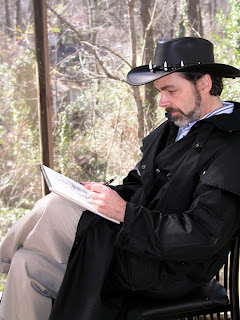 |
| Jef Murray |
His art captures the very essence of Tolkien’s novels, and once you’ve viewed his work, I think you’ll agree: Jef Murray is one the great artists of our time.
1. You reside in Decatur, Georgia. Were you born and raised there as well?
I was born in Melbourne, Florida, and I’ve lived in Tennessee, Texas, Virginia, and Ethiopia (!). However, I’ve spent the vast majority of my life in Georgia, so I’m about as ”deep southern” an American as you’ll find anywhere.
2. How old were you when you first realized you wanted to become an artist?
We all tend to think “well, I’d like to be an artist, so first I’ll read up on art, then I’ll buy some paints and paintbrushes, and then I’ll take some classes, and I’ll study under someone, and then I’ll be an artist!” Sounds about right, yes? The problem is, it never works that way!
First, you must be an artist. That is, you must feel that you deeply and intensely want to create paintings and sketches; you want to make beautiful things, or tell wonderful tales with pictures; you want to release the emotions you hold within you through form, light, and colour. You have, if you will, a calling, or a vocation. Then, with the passion and the love of visual form that you have as an artist, you sketch, you paint, and you continually test out tools and techniques as you explore and fulfill your calling. This is a very medieval way of looking at life: the idea that we all are asked to perform tasks that are uniquely ours to perform, and presumably by someone a lot holier and a lot smarter than we are.
So, in answer to your question, I’ve always been an artist (!). And my job, going forward, is to continue trying to be the best one I can be.
 |
| "Chetwood" |
3. Where did you study and develop you artistic abilities?
I started sketching before I even started writing, and my mother was a high school art teacher and a respected and award-winning artist in her own right. But, I didn’t take formal art classes until I was in college.
I trained as an engineer, but I would sneak over to the college of architecture at Georgia Tech and take what were called “visual communication” classes there, although they were in fact drawing/composition/studio classes. And I was usually the only non-architect major enrolled. After college, I took night classes at the Atlanta College of Art, which is now the Savannah College of Art and Design (SCAD), in downtown Atlanta. But, as with most artists I know, I learned far more on my own than I ever learned in formal training, and that learning is always ongoing.
4. When did Tolkien’s novels first inspire you and your art?
Although The Hobbit was read aloud to me when I was in second grade, I didn’t read The Lord of the Rings until I reached high school, during the late 1970s. I recollect doing some pen and ink sketches that were Tolkien-themed as far back as the early 1980s…of balrogs, of all things. I went on to discover oil painting late in the 1980s, but for whatever reason, I never attempted any Tolkien-themed oils until about the year 2000, roughly the time when I left engineering permanently and began to develop paintings and illustrations professionally.
 |
| "Andunie" |
5. Out of all of Tolkien’s works, what is the most inspiring to you and why?
Tough question! I love all three of Tolkien’s best-known works (The Silmarillion, The Hobbit, and The Lord of the Rings) tremendously, and if you search through my website you’ll find drawings and paintings inspired by all of them. I am moved and transported by them all, but each provokes me as an artist in a different way.
I love the deep mystical classicism of The Silmarillion, and find that it lends itself to lighting and drawing/painting techniques that are likewise classical and mythological. I love The Hobbit for its playfulness and child-like, fairy tale quality, and for the fact that it is a “coming of age” story about Bilbo. And The Lord of the Rings is the book that in many ways integrates the deep classical themes of The Silmarillion with those of The Hobbit; it tells a profound tale in a very accessible manner…one that takes, with its non- Elvish point of view, a very human and humane look at what it means to be alive in a deeply flawed, fallen, and vulnerable world.
Be sure to check back for Part 2 of the Q&A! To view more of Jef Murray’s art, visit jefmurray.com.
All images are copyright Jef Murray, and are used with permission.
No comments:
Post a Comment